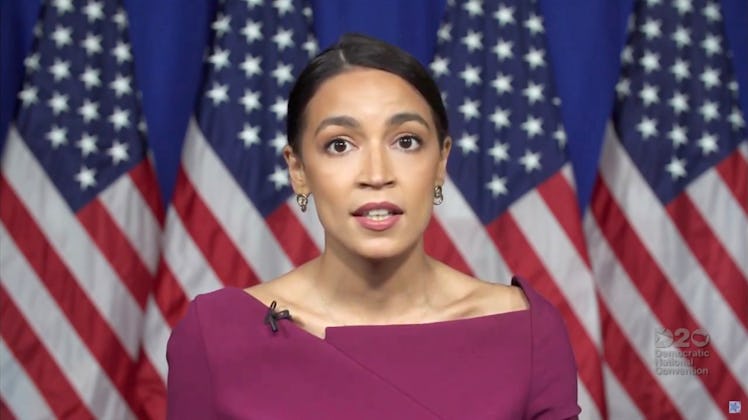
AOC Had A Simple Explanation For Why She Nominated Bernie Sanders At The 2020 DNC
Following Michelle Obama's impassioned keynote address on night one, Democrats virtually gathered on Tuesday, Aug. 18, for the second night of the Democratic National Convention. Freshman Congresswoman Alexandria Ocasio-Cortez (D-New York) was one of the most highly-anticipated speakers of the evening — and she quickly made headlines for touting a number of ambitious progressive topics while expressing her support for Sen. Bernie Sanders (I-Vermont) during her address. At a time when the Democratic party is calling for unity, you may have been surprised to see her not use her time to endorse the final candidate, Vice President Joe Biden, but here's why Alexandria Ocasio-Cortez nominated Bernie Sanders at the 2020 DNC, because it's not what it seems.
On Tuesday night, Ocasio-Cortez initially courted confusion when she announced her nomination of Sanders, who dropped out of the 2020 presidential race in April. "In a time when millions of people in the United States are looking for deep systemic solutions to our crisis of mass evictions, unemployment, and lack of health care — and out of a love for all people, I hereby second the nomination of Sen. Bernard Sanders of Vermont for president of the United States of America," the New York lawmaker said.
Considering Ocasio-Cortez previously backed the Vermont senator when he was still running and she didn't mention Biden during her speech, many wondered if her mention of Sanders was a snub against the former vice president. However, AOC was quick to clear the air, heading to Twitter late Tuesday night to reveal it was all a formality, and she'd been asked to second Sanders' formal nomination during roll call, a standard convention practice which is a symbolic precursor to Sanders transferring his former primary delegates to Biden.
"If you were confused, no worries!" Ocasio-Cortez tweeted. "Convention rules require roll call [and] nominations for every candidate that passes the delegate threshold. I was asked to [second] the nom for Sen. Sanders for roll call." In case there was any confusion about whom she'd be voting for come Election Day, she signaled her support for the former vice president, writing, "I extend my deepest congratulations to @JoeBiden - let’s go win in November."
Sanders was nominated at the DNC because he met a certain threshold of delegates, which is the standard practice. Four years ago, Congresswoman Tulsi Gabbard and two other officials nominated Sanders at the 2016 DNC, before his delegates were then given to Democratic presidential nominee Hillary Clinton when Sanders didn't cross the final threshold to be nominated. While Biden was the presumptive nominee after Sanders dropped out on April 8, he didn’t secure the 1,991 pledged delegates he needed to become the Democrats’ presidential nominee until June 5. After the roll call at the 2020 DNC on Aug. 18, Sanders had 1,151 delegates, and Biden had 3,558 delegates, securing him the Democratic nomination.
Ocasio-Cortez joined former President Bill Clinton and Senate Minority Leader Chuck Schumer of New York in addressing Democratic voters on night two of the convention. Considering AOC's appeal with young voters and her more left-leaning views compared to that of Biden, many were curious to see if she'd take a leaf from Sanders' book and try to close the gap between the Democratic establishment and more progressive voters, or continue to push for more left-leaning policies.
During her roughly 90-second address, Ocasio-Cortez highlighted the "mass people's movement" which is taking place to "establish 21st-century social, economic, and human rights, including guaranteed health care, higher education, living wages, and labor rights for all people in the United States."
Unlike many of the other speakers, Ocasio-Cortez touched on how the movement was working to repair and rebuilt systems that have promoted colonization, violence, and xenophobia. She said she was proud to be a part of a "movement that realizes the unsustainable brutality of an economy that rewards explosive inequalities of wealth for the few, at the expense of long term stability for the many."
Ocasio-Cortez's short allotment of time to speak was a disappointment to some who see her as the face of the younger, more progressive faction of the Democratic Party. According to exit polls of Democratic primary voters ages 18 to 29 on March 3, aka Super Tuesday 2020, 17% voted for Biden at the time, while 63% voted for Sanders. Since then, Biden has attempted to appeal to more progressive voters by working on a Unity Task Force with Sanders, which touts a number of proposals leaning more towards some of the Vermont senator's policies.
With just months to go until the November election, you'll have to wait and see whether Ocasio-Cortez makes more appearances on the campaign trail as the party works to come together and unite behind Biden as he prepares to face off against President Trump.
This article was originally published on